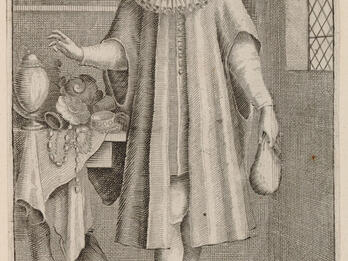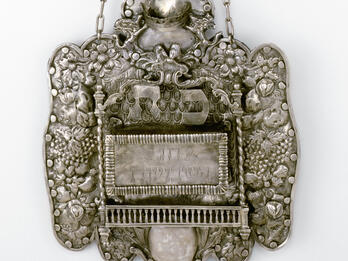Prevenciones divinas contra la vana idolatría de las gentes (Divine Warnings against the False Idolatry of the Nations)
Chapter 2
Warning to Israel against the Incarnation of Christianity
The Lord spoke once more to His beloved people on the occasion of our teacher Moses wishing to see His divine glory: no man shall see me and live (Exodus 33:20), that is to say: no living person may see with bodily eyes my infinite being, and, leaving aside other interpretations of this verse, this suffices for our purpose, seeing that Moses was the holiest and purest of men, and the one who was vouchsafed the most intimate communication with his creator of all mortal beings, and the one who, even in the general perception of the gentiles, exceeded the bounds of humanity, and who, in human bodily form, came closest to the angelic beings. Nonetheless, the Lord did not clear the way for him to see the treasure of His ineffable being, so that he might see Him, since how can a Jew believe that he might see Him in this world with the unclean eyes of living persons, not saintly and beatified in life like Moses, but the profane, pagans, publicans, and women of ill-repute who merited His most immediate communication, His closest flatteries, His favors, His company, and His nearest and continual presence? One can clearly see how arbitrary God would be in His decisions, how little justified in His workings, if he were to concede to the impious bad Jews and, still worse, Roman and Greek idolaters of that time what he denied to the greatest of the prophets, to the most perfect of mortals, to the greatest friend and beloved whom He favored among all men. The Jew is well aware that this cannot be, and that it is repugnant to the divine wisdom to hide the treasures of His divinity from the most deserving and righteous, and then afterwards to make them freely accessible to the perverse, the impious, and to those full of abominations.
But the supreme Creator also saw that the future sectarians would manage to obscure this clear and true doctrine, justifying an accord so without purpose, a change of action so unworthy, saying that God did not reveal Himself to Moses, nor was he capable as a mortal of having a vision so disproportionate to his material being, but that afterwards, [when God was] already in human form, wearing human flesh, there was a very different reason for none to see His divinity, namely, the human appearance in which He covered Himself, and with this there was no impediment to His being seen by all.
Divine wisdom addressed this error when, in order to emphasize that His sublime being [when] neither covered by a veil, nor in a form, nor in a semblance might be shown to the eyes of His creatures—said to the Israelites: my voice you heard, but my figure you did not see, so that borne by error you might not make me any likeness, etc. (Deuteronomy 4:12). The Lord did not permit His people to believe that this infinite majesty could be confined, hidden beneath the semblance of some creature, because it does not reside in [either] the heavens or on earth. How could it reside or stretch out beneath the veil of miserable humanity, how could the One for whom infinite worlds are an undetermined distance away be confined to one place, for how could the incomprehensible deity be represented by, contained in, and united with human organs, in the view of the gentiles? If this were possible, it would not have been impossible for Him to show Himself to Moses, or to His people in some appropriate form, so that through [that form] they might worship Him, seeing that in a short time He would be worshiped through the form of a man. But since this did not happen, He said with total certainty and absolute statement: you did not see my image (Deuteronomy 4:12), since it was not possible for God to be seen, in any image, or to hide His divinity behind the limited partitions of His creatures. Israel preserved these teachings in the sacred law of Sinai so that they should not stumble afterwards over false doctrines. The Christian one is no different from the previous ones, because it and they created deities that were generated, human, born, visible. The Jew learned from the Eternal Creator Himself that God is solitary, eternal, invisible, and exclusive to no living creature, and in none of them [i.e., living creatures] made known or reduced to its miserable insignificance. Consequently, in this it is impossible to err, or to fall into Christianity except if the divine law be forsaken as a result of human fabrications.
The places in the sacred scriptures in which the Lord commands his people not to make or to worship figures, idols, or images are so numerous and so common—beyond the precept in the Decalogue, in which it is expressly commanded—that it would be a waste of time to repeat them. So how could the Israelite Jew allege ignorance and assent to a doctrine that orders him to worship the great variety of idols that were seen in ages past and that have befouled the greater part of the universe? This is so well known that nobody is unaware of it, and so barbaric that already in our times many provinces have abandoned this vain cult, which in some ways has managed to draw close to the sacred scriptures. Even though they persevere with mental idolatry, at least they have rid themselves of external idolatry. How then will the Jew, taught by God Himself to the contrary, admit it, if his very allies and cohorts daily abominate it? How should he consider something to be a divine religion which, since its origin, was essentially dumb and qualified idolatry, and which the Lord has declared to him to be odious and abhorrent from the first moment when He announced and made known the divine word to him?
Translated by
.
Credits
Isaac Orobio de Castro, “Prevenciones divinas contra la vana idolatría de las gentes (Divine Warnings against the False Idolatry of the Nations)” (Manuscript, Amsterdam, ca. 1670). Published as: Isaac Orobio de Castro, Prevenciones divinas contra la vana idolatría de las gentes (Firenze: L. S. Olschki, 2013), 25–28 (Chapter 2, Prevención a Israel contra la encarnación del Christianismo).
Published in: The Posen Library of Jewish Culture and Civilization, vol. 5.




